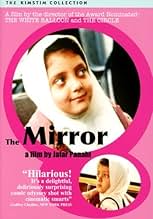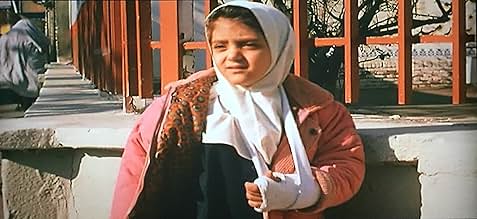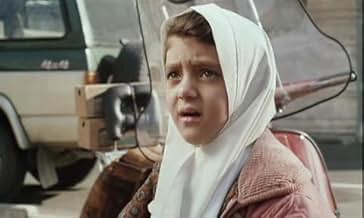Ayneh
- 1997
- 1 Std. 35 Min.
IMDb-BEWERTUNG
7,5/10
3339
IHRE BEWERTUNG
Füge eine Handlung in deiner Sprache hinzuWhen a young girl becomes lost in the hustle and bustle of Tehran, her journey turns into a dazzling exercise on the nature of film itself.When a young girl becomes lost in the hustle and bustle of Tehran, her journey turns into a dazzling exercise on the nature of film itself.When a young girl becomes lost in the hustle and bustle of Tehran, her journey turns into a dazzling exercise on the nature of film itself.
- Auszeichnungen
- 4 Gewinne & 1 Nominierung insgesamt
Empfohlene Bewertungen
This is a pure concept: Director has chosen to play with two resources: camera and sound. No music, no SFX.
The story itself is quite surprising.
Sometimes, the lower the budget, the greater the creativity. The border between documentary and film is blurred, so the sense of "reality" is quite present and remains till the end.
The director also plays with the audience: there is a certain point when the viewer feels to be misplaced.
As Rene Magritte's painting "la Vengeance", in which the artist does not accept the inherent limitations of his art, he dares to paint outside the easel, that way Jafar Panahi goes beyond the usual simple structure of the movies.
Just for "independent advanced" movie goers.
9/10
The story itself is quite surprising.
Sometimes, the lower the budget, the greater the creativity. The border between documentary and film is blurred, so the sense of "reality" is quite present and remains till the end.
The director also plays with the audience: there is a certain point when the viewer feels to be misplaced.
As Rene Magritte's painting "la Vengeance", in which the artist does not accept the inherent limitations of his art, he dares to paint outside the easel, that way Jafar Panahi goes beyond the usual simple structure of the movies.
Just for "independent advanced" movie goers.
9/10
This is a film about a girl going home. Apparently her mother failed to pick our little heroine up, and the feisty second grader sets out to find her way through the asphalt jungle all by herself. Well, there's more to it of course. It's the asphalt jungle of Tehran and the film was directed by Jafar Panahi, one of the innovative film makers of the Iranian New Wave. Not that his latest works are allowed to be shown in his home country, mind you. Sentenced to a six-year jail term in 2010 and banned from directing he nevertheless defiantly made an iPhone production called "This Is Not a Film" about his situation and managed to smuggle it out of Iran and tell the world.
The Iranian situation as such is already portrayed firsthand in Panahi's early 1997 film. A representative of the next generation, a child, in the center, we witness its abandonment by the adults. We eavesdrop on them complaining, but not really listening, observe the gender segregation on public transport (albeit through an innocent perspective in between as the missing link), but in a sea of scarves, uniform looks and the all encompassing everyday turmoil one can barely get a glimpse of something one could call "individuality"... In the words of Panahi: Everyone is wearing a mask, plays a role. Thanks to the stark realism present in Iranian movies we become part of the life and the hustle and bustle therein, get sucked in by following the odyssey through a child's eye. And we'll reach a point in the film where a clever twist cranks it all even up a notch. Thus a very real situation turns even more real and it results in a powerful reflection with a double meaning, within the film and outside of it. As in his preceding picture "The White Balloon", also centering on a cast of children, the tone in Panahi's "The Mirror" is light, and the film is entertaining throughout, yet layered and thought-provoking. There's someone who stands up to find a way, lost, but determined, wandering around in need for directions. But there's a fundamental difference between directions and direction, as the viewer might notice. No coincidence either that this someone we're talking about is a girl, the focus of some of Panahi's other works. Or let's say it that way: This is not a film... about a girl going home.
The Iranian situation as such is already portrayed firsthand in Panahi's early 1997 film. A representative of the next generation, a child, in the center, we witness its abandonment by the adults. We eavesdrop on them complaining, but not really listening, observe the gender segregation on public transport (albeit through an innocent perspective in between as the missing link), but in a sea of scarves, uniform looks and the all encompassing everyday turmoil one can barely get a glimpse of something one could call "individuality"... In the words of Panahi: Everyone is wearing a mask, plays a role. Thanks to the stark realism present in Iranian movies we become part of the life and the hustle and bustle therein, get sucked in by following the odyssey through a child's eye. And we'll reach a point in the film where a clever twist cranks it all even up a notch. Thus a very real situation turns even more real and it results in a powerful reflection with a double meaning, within the film and outside of it. As in his preceding picture "The White Balloon", also centering on a cast of children, the tone in Panahi's "The Mirror" is light, and the film is entertaining throughout, yet layered and thought-provoking. There's someone who stands up to find a way, lost, but determined, wandering around in need for directions. But there's a fundamental difference between directions and direction, as the viewer might notice. No coincidence either that this someone we're talking about is a girl, the focus of some of Panahi's other works. Or let's say it that way: This is not a film... about a girl going home.
A child (Mina Mohammad Khani) waits in vain for her mother to pick her up after school. Whether she tries to resolve the dilemma herself or asks for help from the adult world, this serious little girl confronts dead-ends. At first She asks help from a motorcycle driver and the guy gives her a lift to the bus-stop then she takes the wrong bus so on and on.She challenges the adult world. "If you can show me the way I can go by myself" is a repeated line in the movie but the adult world does regard her either weak or it doesn't care about her.The close camera shot right on the little girl is very good really and the performance of this little girl deserves a standing ovation. Great job! The only thing is that I felt that the movie lacks a little bit action through the turmoil of urban life. The director focuses on littler girl more than necessary I guess. We hear some external voices (like the people on the bus) but the camera is always on the girl so this feels a little bit passive. Other than that it's really great!
10Red-125
Ayneh (The Mirror) is an unusual, interesting, and compelling work. The young star, Mina, is type-cast as a forceful and self-reliant young girl. The city of Teheran, as portrayed, has an almost anarchic quality to its vehicle and pedestrian traffic rules. The constant threat of accident adds a real edge to this cinema verité film. (In fact, the only problem I had with this movie was the ethical concern of allowing any actor, especially a young girl, anywhere near all this traffic.)
The Mirror is an excellent choice if you are looking for a noisy, exciting portrayal of an individual caught up in a realistic urban setting. Not a soothing film, but in my opinion, a great one.
The Mirror is an excellent choice if you are looking for a noisy, exciting portrayal of an individual caught up in a realistic urban setting. Not a soothing film, but in my opinion, a great one.
Although this is no Hollywood, but just like another day in LA the poor director is having trouble with his temperamental star, save by quick thinking he somehow has turn this film into (perhaps) a far more interesting movie then he has intended.
Little Mina is a good actress, if not a very professional one, but one should consider that she is only in second year of her primary school and she has plenty of character to make up for it.
The film follows the day of Mina, and how she was trying to find her way home which mirrors the story of the film she no longer wants to take part in. The film lets us see the world from a little girl's point of view, hear her thoughts... it's a little reminder of how it was when we were little... being a child is not easy... no one wants to take you seriously, it takea you twice the time just to dial at a payphone, you don't remember those funny names grown up call those road.
It is a very interesting film, perhaps slow at first, but it will certainly make you laughs, make you think.
Little Mina is a good actress, if not a very professional one, but one should consider that she is only in second year of her primary school and she has plenty of character to make up for it.
The film follows the day of Mina, and how she was trying to find her way home which mirrors the story of the film she no longer wants to take part in. The film lets us see the world from a little girl's point of view, hear her thoughts... it's a little reminder of how it was when we were little... being a child is not easy... no one wants to take you seriously, it takea you twice the time just to dial at a payphone, you don't remember those funny names grown up call those road.
It is a very interesting film, perhaps slow at first, but it will certainly make you laughs, make you think.
Wusstest du schon
- WissenswertesThe film stars Mina Mohammadkhani, the sister of Aida Mohammadkhani (The White Balloon).
- VerbindungenFeatured in Dies ist kein Film (2011)
Top-Auswahl
Melde dich zum Bewerten an und greife auf die Watchlist für personalisierte Empfehlungen zu.
- How long is The Mirror?Powered by Alexa
Details
- Erscheinungsdatum
- Herkunftsland
- Offizieller Standort
- Sprache
- Auch bekannt als
- The Mirror
- Drehorte
- Produktionsfirma
- Weitere beteiligte Unternehmen bei IMDbPro anzeigen
Box Office
- Bruttoertrag in den USA und Kanada
- 69.915 $
- Weltweiter Bruttoertrag
- 69.915 $
Zu dieser Seite beitragen
Bearbeitung vorschlagen oder fehlenden Inhalt hinzufügen

















